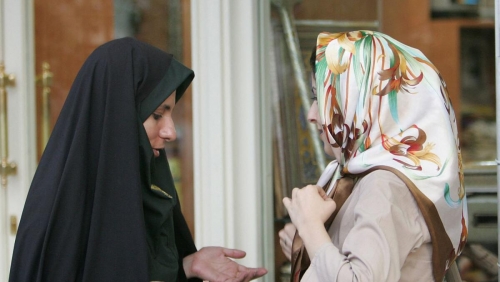Iranian activists, US dismiss claim morality police abolished
Agencies | Tehran
The Daily Tribune – www.newsofbahrain.com
Iranian activists and Western nations on Monday dismissed a claim that the protest-hit Islamic republic is disbanding its notorious morality police, insisting there was no change to women's rights.
There were also calls on social media for a three-day strike in Iran, culminating Wednesday on the annual Student Day, nearly three months into a nationwide wave of unrest sparked by the death in custody of Kurdish-Iranian woman Mahsa Amini.
Morality police officers had arrested Amini, 22, in Tehran for allegedly flouting Iran's strict dress code demanding women wear modest clothing and the hijab headscarf.
"Nothing we have seen suggests Iran's leadership is improving its treatment of women and girls or ceasing the violence it inflicts on peaceful protesters," the US State Department said.
Germany's foreign ministry said Iranian protesters "want to live freely and in self-determination", and disbanding the morality police, "if it is implemented, won't change that".
Amini's death on September 16 triggered women-led protests that have spiralled into the biggest challenge to the regime since the 1979 Islamic revolution. Hundreds of Iranians, including some members of the security forces, have been killed.
In a surprise move over the weekend, Iran's Prosecutor General Mohammad Jafar Montazeri was quoted as saying that the morality police units - known formally as Gasht-e Ershad ("Guidance Patrol") - had been closed down.
But campaigners were sceptical about his comments, which appeared to be an impromptu response to a question at a conference rather than a clearly signposted announcement by the interior ministry.
"Unless they remove all legal restrictions on women's dress and the laws controlling citizens' private lives, this is just a PR move," Roya Boroumand, co-founder of the US-based Abdorrahman Boroumand Center rights group, told AFP.
Abolishing the force, activists argued, would mark no change to Iran's headscarf policy - a key ideological pillar for its clerical leadership - but rather a switch in tactics on enforcing it.
And scrapping the units would be "probably too little too late" for the protesters who now demand outright regime change, Boroumand said.
"Nothing prevents other law enforcement" bodies from policing "the discriminatory laws", she noted.
The morality police have been a familiar sight since 2006 when they were introduced during the presidency of the ultra-conservative Mahmoud Ahmadinejad.
But the rules, including the headscarf, had been strictly enforced well before then by the clerical leadership that had taken the helm after the fall of the secularist shah in 1979.
It was anger over the obligatory headscarf rule that sparked the first protests following the death of Amini, whose family says died from a blow to her head sustained in custody. The authorities dispute this.
But the protest movement, fed also by years of anger over economic grievances and political repression, is now marked by calls for an end to the Islamic republic led by Ayatollah Ali Khamenei.
Norway-based group Iran Human Rights (IHR) told AFP on Monday that at least 504 people had been executed in Iran this year -- far more than in the whole of last year -- some in connection with the anti-regime movement.
"These executions are intended to create societal fear," the group's director Mahmood Amiry-Moghaddam said.
Reports from Tehran have suggested the feared morality police vans had already become much less common or even vanished after the protests broke out.
Images have also shown women smashing decades-long taboos by attending protests and carrying out daily tasks like going shopping without headscarves.
"The alleged suspension of Iran's morality police doesn't mean anything," argued Omid Memarian of the group Democracy for the Arab World Now, citing "the massive level of women's civil disobedience".
He described the mandatory headscarf as "one of the pillars of the Islamic republic", and abolishing it "would mean a fundamental change in the Islamic republic's identity and existence".
Montazeri's declaration and the confusion that ensued were seen as a sign of the disquiet within the regime over how to handle the protests, which continue despite a crackdown that the IHR said has left at least 448 people dead.
Conservative media in Iran largely ignored the comments on Monday, with only reformist dailies putting the issue on their front page.
"Is this the end of the patrols?" the Sharq newspaper asked, noting the police public relations had not confirmed it.
Memarian said it was an example of "deceptive moves the Islamic republic employs at times of desperation" and warned that "other restrictive policies and measures" may follow.
The hijab is "still compulsory", said Shadi Sadr, co-founder of London based group Justice for Iran. While the protests started over Amini's death, he predicted, "Iranians won't rest until the regime is gone."
Related Posts

